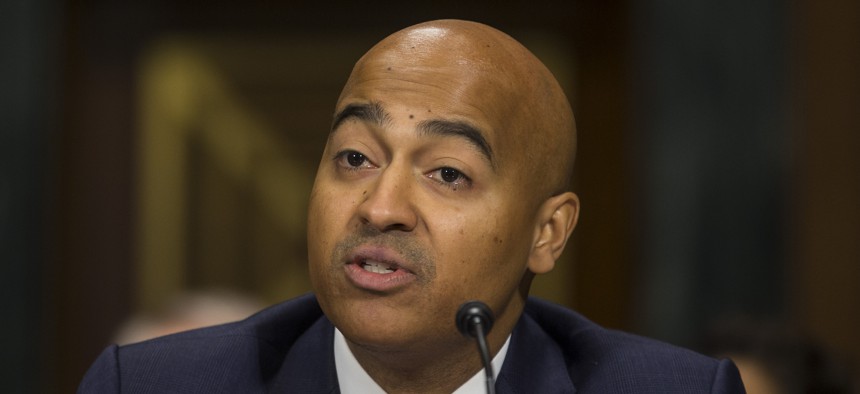
Travis LeBlanc testifies during a hearing on Capitol Hill on Feb. 5, 2019. LeBlanc was fired from his position on the Privacy and Civil Liberties Oversight Board. Zach Gibson / Getty Images
Ousted independent agency leaders detail how they’re fighting their firings
President Donald Trump has sought to exert more influence over independent agencies, which are supposed to be led by members of both parties and have some degree of separation from the White House.
When Travis LeBlanc initially found out that he would be removed from his position as a member of the Privacy and Civil Liberties Oversight Board, he received a message from a person he didn’t know to his government email that was also sent to his law firm email and a “random” Yahoo address of someone with his last name.
“He's writing on behalf of the president, asking for my resignation within 48 hours or I would be terminated,” LeBlanc recalled. “And then there was a sentence at the end of the email that said ‘If, however, the president determines that your services are still needed, you'll hear from us again.’ And I was like ‘Well, this is odd. Am I fired? I didn’t know what that was.’ I just thought it was a joke.”
Despite his term not ending until 2028, LeBlanc was ultimately removed along with the other Democratic members of PCLOB, an independent oversight panel that probes potential civil liberties infringements in the intelligence community.
LeBlanc spoke at a panel discussion Wednesday put on by the Center for American Progress, a progressive policy institute, that featured fired Democratic members of independent agencies, which were created by Congress to have some degree of separation from the White House and are generally boards and commissions with multiple members from both parties.
The removed officials warned that their firings show that President Donald Trump intends to curtail the independence of these agencies.
“The message is clear: If you obey, you stay. And if you don’t, you won’t,” said Alvaro Bedoya, an axed member of the Federal Trade Commission.
Bedoya argued that reducing the independence of the FTC matters “less about politics and more about money.” For example, he said that when the agency sued to block Kroger’s acquisition of Alberstons, which ended with the grocery stores dropping the merger, commissioners received direct and indirect outreach from elected officials of both parties urging them to drop their lawsuit.
He also pointed to Meta CEO Mark Zuckerberg’s efforts to make inroads with Trump, as the FTC is leading an antitrust lawsuit against the company.
“When Congress created this idea that there should only be removal from these [independent] commissions for a certain set of circumstances, it wasn't just about this party or that party affecting politics,” Bedoya said. “It was about money infecting law enforcement and preventing that infection.”
Bedoya and Rebecca Slaughter, another fired Democratic FTC commissioner, sued to reverse their removals, contending that federal law and Supreme Court precedent block the president from removing FTC commissioners over policy differences.
In the meantime, Bedoya said he is “burning through” savings but is still performing parts of his role that he can do, including meeting with workers and issuing statements.
“When disorder happens, most good people say, ‘Oh, this is disorder. I'm going to respond in an orderly way. I'm going to try to take the temperature down and respond by…keep[ing] my head down and let's be done with this.’ I think it's really important to meet disorder with disorder and not accept the terms that are being put upon you, if those terms are overtly illegal, and not accept the reality that people are trying to create if it flies in the face of a century of American law,” he said to a smattering of applause.
LeBlanc also filed a lawsuit over his firing.
Charlotte Burrows, the third panelist, was removed in January from her post on the Equal Employment Opportunity Commission before the end of her term. In her comments, she highlighted a letter signed by her and other former EEOC officials criticizing the agency’s acting Chair Andrea Lucas over a letter she sent to 20 law firms requesting information about their diversity, equity and inclusion practices. Such practices, Lucas argued, could “entail unlawful disparate treatment…based on race, sex or other protected characteristics.”
Some of the firms that were sent the letter have also been targeted by Trump in executive orders.
“I think it is incredibly important to protect the institution and the integrity of what that civil rights agency does. It's an agency that came out of the March on Washington for Jobs and Freedom. We were the jobs part of that request,” Burrows said. “The agency's 60th anniversary is this year, and there's a proud tradition, but also really a core tradition, of trying to get up every single day and remind the American people that we can live our values. We can be about equal justice under the law. So I've continued to think about how to carry that message, even though I no longer have access to my office or my emails.”
A lawsuit from Cathy Harris of the Merit Systems Protection Board and Gwynne Wilcox of the National Labor Relations Board, both of whom were fired from their positions at the respective independent agencies, has advanced the furthest in the courts. Their removals have been both blocked and upheld, but, most recently, the Supreme Court has allowed them to be temporarily removed.
Trump in February signed an executive order to exert more White House control over independent agency regulations.
“For the Federal Government to be truly accountable to the American people, officials who wield vast executive power must be supervised and controlled by the people's elected President,” Trump wrote in the EO.
How are these changes affecting you? Share your experience with us:
Sean Michael Newhouse: snewhouse@govexec.com, Signal: seanthenewsboy.45
NEXT STORY: State to slash 15% of domestic staff, eliminate 132 offices







